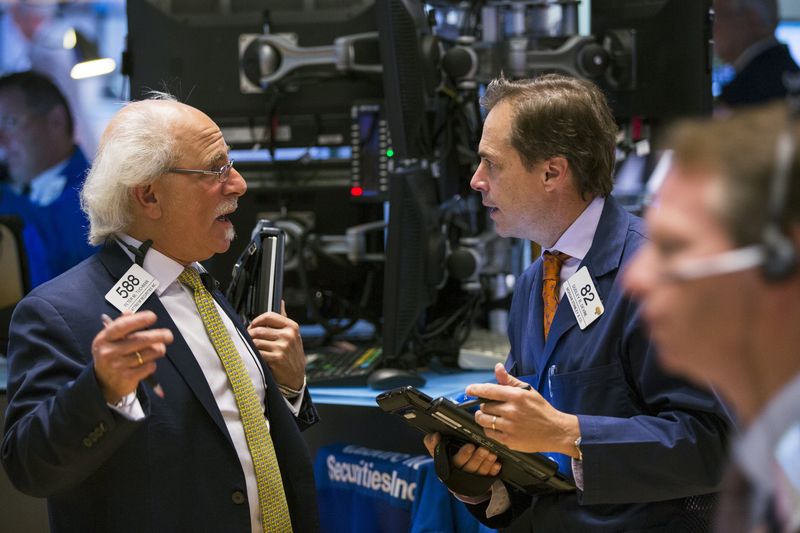Investing.com - Here are the top five things you need to know in financial markets on Wednesday, March 27:
1. U.S. Futures Edge Lower, Yield Curve Stays Inverted
U.S. stock index futures pointed to a cautiously lower open, with investors keeping their eyes on movements in the U.S. Treasury market, where the yield curve remained inverted for the fourth consecutive session.
At 5:55 AM ET (9:55 GMT), the blue-chip Dow futures were down 42 points, or about 0.2%, the S&P 500 futures dipped 2 points, or around 0.1%, while the tech-heavy Nasdaq 100 futures indicated a flat open.
U.S. Treasury bond yields continued to dictate sentiment, with the benchmark 10-year note standing at 2.36%, its lowest level since December 2017.
The yield on the three-month Treasury bill, meanwhile, was at 2.45%.
A yield curve inversion has in the past been a reliable indicator of recession, especially if sustained over a longer period of time.
On the data front, international trade figures for January will be released at 8:30AM ET (12:30 GMT). Fourth-quarter current account balance data will be published at the same time.
Elsewhere, European stocks were lower in mid-morning trade, with many of the major bourses across the region in negative territory.
Earlier, markets in Asia closed mixed.
2. Boeing to Brief Pilots, Regulators on 737 MAX Fix
It's a big day for Boeing (NYSE:BA) as it attempts to rebuild trust following two deadly crashes involving 737 MAX airliners.
The company will brief more than 200 global airline pilots, technical leaders and regulators on software and training updates for the aircraft, its best seller in recent years. Boeing has received orders for the plane worth more than $500 billion at list prices.
The session in Renton, Washington, is part of an effort to reach all current, and many future, 737 MAX operators and their home regulators to discuss software and training updates to the jet, Boeing said in a statement.
3. Brexit 'Indicative Votes'
British Prime Minister Theresa May is expected to indicate a date for quitting as the price for getting her twice-defeated Brexit deal ratified, while parliament tries to select its own alternative from a multiple-choice list of options ranging from a much closer post-exit alignment with the EU to leaving without a deal or revoking the divorce papers.
May is expected to indicate a date for her departure at a showdown with Conservative Party lawmakers at a meeting of the 1922 Committee in Westminster at around 1:00PM ET (17:00 GMT).
Before that, lawmakers start a debate on what sort of EU divorce the world's fifth-largest economy should go for. They will vote at 3:00PM ET (19:00 GMT) on a ballot paper for as many proposals as they wish. Results will be announced after 5PM ET (21:00 GMT).
The pound was little changed at around the $1.32-level.
4. Dovish Draghi
The European Central Bank is willing to further delay a planned interest rate hike if necessary and may look at measures to mitigate any side effects of negative interest rates, ECB President Mario Draghi said.
"Just as we did at our March meeting, we would ensure that monetary policy continues to accompany the economy by adjusting our rate forward guidance to reflect the new inflation outlook," Draghi told a conference in Frankfurt.
Reversing course earlier this month in response to an unexpected slowdown, the ECB has put plans to 'normalize' policy on hold, providing banks with even more liquidity and delaying a rate hike from record lows until next year.
The euro was trading at $1.1285.
5. EIA Oil Supply Report
In commodities, the U.S. Energy Information Administration will release its official weekly oil supplies report for the week ended March 22 at 10:30AM ET (14:30 GMT). Analysts expect the EIA to report a decline of 1.2 million barrels in crude inventories.
The American Petroleum Institute, a trade organization, said late on Tuesday that U.S. crude inventories rose 1.9 million barrels in the latest week.
The API and EIA figures often diverge.
U.S. West Texas Intermediate crude futures were down 42 cents, or around 0.7%, at $59.51 a barrel.
International Brent crude oil futures were at $67.21 per barrel, down 22 cents, or 0.3%.
Prices remained supported as Venezuela's main oil export port of Jose and its four crude upgraders were unable to resume operations following a massive power blackout on Monday, the second in a month.
Read more: With Oil Hovering Around $60, These Shale Drillers Are Worth Considering: Jesse Cohen
-- Reuters contributed to this report
